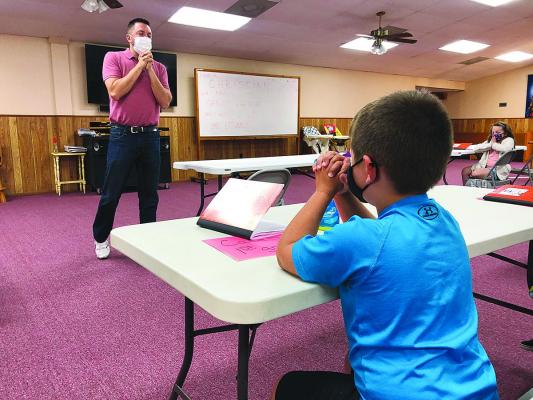After School Funding at Risk
A lack of funding could cause the Redeemer After School Roundup Program to end, but people are working behind the scenes to make sure that doesn’t happen.
At Commissioner’s Court last week, a donation from the Building Bridges Foundation provided a start to keep the program around through the end of the school year and the rest of the money needed is in the proposed budget of the County to be voted on at the next Commissioners Court meeting.
Lack of state funding put the After School Program in the bind they are currently in.
“The state had to make a cutback of .05 percent which got rid of these programs,” Willie Caesar, chief juvenile probation officer said. “The program has been funded by the state branch of the Texas Juvenile Justice Department. The program is prevention intervention program for at-risk youths, ages six to 17. School can use it to help with prevention intervention however they want and Edna uses it for first, second, and third grade students at Edna ISD.”
The program is a way to help kids with their education and in turn keeps them busy so they stay out of trouble.
“The at-risk kids who are having problems learning– this gives them an extra place to go and to accomplish their needs to be successful,” Caesar said. “They can get extra help on the computers and they also provide snacks and drinks when they get out of school. I look at it like all kids are at risk. Everyone is one mistake away from coming through this (Juvenile Detention Center) door. Nobody is perfect, so I say this program is for everybody, and the main goal is to start it early and to keep the kids out of the Juvenile Justice Department.”
The program originally started with more kids than the volunteers and teachers were ready for, but Redeemer has it to a number that works well for them.
“When we first started it was over 100 kids which was overwhelming because we were ready for about 50 kids, so they were having to tweak some things,” Caesar said. “I think when Redeemer took over they got the numbers more manageable with the workers they had, and their focus is just for the young ones. When it first started it was for all kids, but most of the turnout was elementary and some junior high. Now it is for first through third grade.”
The program has been a success and now Ganado is looking to possibly join with an after school program of their own.
“I think we are going to try to expand the program to Ganado,” Caesar continued. “First Baptist Church is interested in getting something going for the Ganado kids. If we can expand to our kids at Industrial, they are all kids and it will help them all. It is a positive thing. But there is only so much money and so much you can do.”
Deciding which student is considered “at risk” or getting the correct student into the program involves several steps. “There are 12 students nominated in each grade – first through third,” Rose Williams, director of the After School Program, said. “If they say no, we keep them on a waiting list, so we just go to the next name. A parent can also go talk to the teacher about recommending them for the program.”
Being involved in the program helps the students in tangible ways.
“We do a rotation between math concepts and reading concepts and study skills and we give encouragement,” Williams said. “We know it helps them because we see it on their report cards and we have a decrease in behavior incidents. They build the confidence we can see it.”
During a regular school year, Redeemer has about 30 students, although this year they are down to 21. Pastor Andrew Schroer, who provides a devotional at the beginning of each class, said “it’s a wonderful program, to the schools and the children. The whole point is to give kids the added boost so they can succed at both school and life.”
If things stay the same and the state doesn’t have the funding next year, the after school program will again need someone to help with funding so they are able to continue the program.

